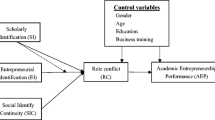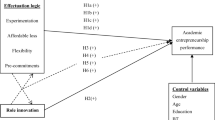Abstract
Despite the growing interest in academic entrepreneurs’ role conflict, we have not gained sufficient insights into its antecedents. Based on social learning theory, we examine how academic entrepreneurs’ prior experience—prior academic experience and prior entrepreneurial experience—influence their role conflict. Through multilevel linear regression and robustness tests using data from 394 academic entrepreneurs, we show that prior academic experience positively impacts role conflict, while prior entrepreneurial experience negatively impacts role conflict. Moreover, the negative effect of academic experience is weaker for academic entrepreneurs who have a longer length of prior entrepreneurial experience. Our study contributes to the literature on the antecedents of academic entrepreneurs’ role conflict and has important practical implications for academic entrepreneurial project cultivation and selection.


Similar content being viewed by others
Notes
For example, if there is a missing value in the role conflict scale, we regressed role conflict with the remaining 4 items. This method has been proven effective and efficient for self-reported scales, especially when the number of missing values is small (approximately 10%)(Shrive et al., 2006).
References
Abreu, M., & Grinevich, V. (2013). The nature of academic entrepreneurship in the UK: Widening the focus on entrepreneurial activities. Research Policy, 42(2), 408–422.
Ashforth, B. (2000). Role transitions in organizational life: An identity-based perspective. Routledge.
Ashforth, B., & Johnson, S. A. (2001). Which hat to wear? The relative salience of multiple identities in organizational contexts. In M. A. Hogg & D. J. Terry (Eds.), Social identity processes in organizational contexts (pp. 31–48). Psychology Press.
Balven, R., Fenters, V., Siegel, D. S., & Waldman, D. (2018). Academic entrepreneurship: The roles of identity, motivation, championing, education, work-life balance, and organizational justice. Academy of Management Perspectives, 32(1), 21–42.
Bandura, A. (1977). Social learning theory. Prentice Hall.
Bartunek, J. M., & Rynes, S. L. (2014). Academics and practitioners are alike and unlike: The paradoxes of academicpractitioner relationships. Journal of Management, 40(5), 1181–1201.
Baù, M., Sieger, P., Eddleston, K. A., & Chirico, F. (2017). Fail but try again? The effects of age, gender, and multiple–owner experience on failed entrepreneurs’ reentry. Entrepreneurship Theory and Practice, 41(6), 909–941.
Biddle, B. J. (1986). Recent developments in role theory. Annual Review of Sociology, 12(1), 67–92.
Bo, Z., Guo, J., Feng, G., Yan, S., & Li, Y. (2019). Who am i? the influence of social identification on academic entrepreneurs’ role conflict. International Entrepreneurship and Management Journal, 15(2), 1–22.
Chang, Y.-C., Yang, P. Y., Martin, B. R., Chi, H.-R., & Tsai-Lin, T.-F. (2016). Entrepreneurial universities and research ambidexterity: A multilevel analysis. Technovation, 54, 7–21.
Clarke, J., & Holt, R. (2017). Imagery of ad-venture: Understanding entrepreneurial identity through metaphor and drawing. Journal of Business Venturing, 32(5), 476–497.
Clarysse, B., Tartari, V., & Salter, A. (2011). The impact of entrepreneurial capacity, experience and organizational support on academic entrepreneurship. Research Policy, 40(8), 1084–1093.
Dimov, D. (2010). Nascent entrepreneurs and venture emergence: Opportunity confidence, human capital, and early planning. Journal of Management Studies, 47(6), 1123–1153.
Endicott, L., Bock, T., & Narvaez, D. (2003). Moral reasoning, intercultural development, and multicultural experiences: Relations and cognitive underpinnings. International Journal of Intercultural Relations, 27(4), 403–419.
Farmer, S. M., Yao, X., & Kung-Mcintyre, K. (2011). The behavioral impact of entrepreneur identity aspiration and prior entrepreneurial experience. Entrepreneurship Theory and Practice, 35(2), 245–273.
Fee, A., Gray, S. J., & Lu, S. (2013). Developing cognitive complexity from the expatriate experience: Evidence from a longitudinal field study. International Journal of Cross Cultural Management, 13(3), 299–318.
Festinger, L. (1957). A theory of cognitive dissonance. Stanford University Press.
Gielnik, M. M., Spitzmuller, M., Schmitt, A., Klemann, D. K., & Frese, M. (2015). “I put in effort, therefore I am passionate”: Investigating the path from effort to passion in entrepreneurship. Academy of Management Journal, 58(4), 1012–1031.
Greenhaus, J. H., & Beutell, N. J. (1985). Sources of conflict between work and family roles. Academy of Management Review, 10(1), 76–88.
Grimaldi, R., Kenney, M., Siegel, D. S., & Wright, M. (2011). 30 years after Bayh–Dole: Reassessing academic entrepreneurship. Research Policy, 40(8), 1045–1057.
Guo, F., Zou, B., Guo, J., Shi, Y., Bo, Q., & Shi, L. (2019). What determines academic entrepreneurship success? A social identity perspective. International Entrepreneurship and Management Journal, 15(3), 929–952.
Hall, D. T. (1972). A model of coping with role conflict: The role behavior of college educated women. Administrative Science Quarterly, 17(4), 471–486.
Hayter, C. S. (2015). Social networks and the success of university spin-offs: Toward an agenda for regional growth. Economic Development Quarterly, 29(1), 3–13.
Hayter, C. S., Lubynsky, R., & Maroulis, S. (2017). Who is the academic entrepreneur? The role of graduate students in the development of university spinoffs. The Journal of Technology Transfer, 42(6), 1237–1254.
Jain, S., George, G., & Maltarich, M. (2009). Academics or entrepreneurs? Investigating role identity modification of university scientists involved in commercialization activity. Research Policy, 38(6), 922–935.
Jawahar, I., Stone, T. H., & Kisamore, J. L. (2007). Role conflict and burnout: The direct and moderating effects of political skill and perceived organizational support on burnout dimensions. International Journal of Stress Management, 14(2), 142–159.
Jenkins, A. S., Wiklund, J., & Brundin, E. (2014). Individual responses to firm failure: Appraisals, grief, and the influence of prior failure experience. Journal of Business Venturing, 29(1), 17–33.
Kolb, D. A. (1984). Experiential learning: Experience as the source of learning and development. Prentice-Hall.
Le, S., & Kroll, M. (2017). CEO international experience: Effects on strategic change and firm performance. Journal of International Business Studies, 48(5), 573–595.
Li, M., Mobley, W. H., & Kelly, A. (2013). When do global leaders learn best to develop cultural intelligence? An investigation of the moderating role of experiential learning style. Academy of Management Learning & Education, 12(1), 32–50.
Li, Y., Zou, B., Guo, F., & Guo, J. (2020). Academic entrepreneurs’ effectuation logic, role innovation, and academic entrepreneurship performance: An empirical study. International Entrepreneurship and Management Journal, 16(9), 1–24.
Lin, S., Yamakawa, Y., & Li, J. (2019). Emergent learning and change in strategy: Empirical study of chinese serial entrepreneurs with failure experience. International Entrepreneurship and Management Journal, 15(3), 773–792.
Lumpkin, G. T., Cogliser, C. C., & Schneider, D. R. (2009). Understanding and measuring autonomy: An entrepreneurial orientation perspective. Entrepreneurship Theory and Practice, 33(1), 47–69.
McMullen, J. S., & Shepherd, D. A. (2006). Entrepreneurial action and the role of uncertainty in the theory of the entrepreneur. Academy of Management Review, 31(1), 132–152.
Meek, W. R., & Wood, M. S. (2016). Navigating a sea of change: Identity misalignment and adaptation in academic entrepreneurship. Entrepreneurship Theory and Practice, 40(5), 1093–1120.
Méndez-Picazo, M. T., Galindo-Martín, M. A., & Castaño-Martínez, M. S. (2021). Effects of sociocultural and economic factors on social entrepreneurship and sustainable development. Journal of Innovation & Knowledge, 6(2), 69–77.
Miralles, F., Giones, F., & Riverola, C. (2016). Evaluating the impact of prior experience in entrepreneurial intention. International Entrepreneurship and Management Journal, 12(3), 791–813.
Olugbola, S. A. (2017). Exploring entrepreneurial readiness of youth and startup success components: Entrepreneurship training as a moderator. Journal of Innovation & Knowledge, 2(3), 155–171.
Pascarella, E. T., Martin, G. L., Hanson, J. M., Trolian, T. L., Gillig, B., & Blaich, C. (2014). Effects of diversity experiences on critical thinking skills over 4 years of college. Journal of College Student Development, 55(1), 86–92.
Piaget, J. (1954). The child’s construction of reality. Basic Books.
Rerup, C. (2005). Learning from past experience: Footnotes on mindfulness and habitual entrepreneurship. Scandinavian Journal of Management, 21(4), 451–472.
Rizzo, J. R., House, R. J., & Lirtzman, S. I. (1970). Role conflict and ambiguity in complex organizations. Administrative Science Quarterly, 15(2), 150–163.
Rosenlund, J., & Legrand, C. (2021). Algaepreneurship as academic engagement: Being entrepreneurial in a lab coat. Industry and Higher Education, 35(1), 28–37.
Shibayama, S. (2012). Conflict between entrepreneurship and open science, and the transition of scientific norms. The Journal of Technology Transfer, 37(4), 508–531.
Shrive, F. M., Stuart, H., Quan, H., & Ghali, W. A. (2006). Dealing with missing data in a multi-question depression scale: A comparison of imputation methods. BMC Medical Research Methodology, 6(1), 1–10.
Stets, J. E., & Burke, P. J. (2000). Identity theory and social identity theory. Social Psychology Quarterly, 63(3), 224–237.
Stuart, R., & Abetti, P. A. (1987). Start-up ventures: Towards the prediction of initial success. Journal of Business Venturing, 2(3), 215–230.
Stuart, R. W., & Abetti, P. A. (1990). Impact of entrepreneurial and management experience on early performance. Journal of Business Venturing, 5(3), 151–162.
Takeuchi, R., Tesluk, P. E., Yun, S., & Lepak, D. P. (2005). An integrative view of international experience. Academy of Management Journal, 48(1), 85–100.
Toft-Kehler, R., Wennberg, K., & Kim, P. H. (2014). Practice makes perfect: Entrepreneurial-experience curves and venture performance. Journal of Business Venturing, 29(4), 453–470.
Ucbasaran, D., Westhead, P., Wright, M., & Flores, M. (2010). The nature of entrepreneurial experience, business failure and comparative optimism. Journal of Business Venturing, 25(6), 541–555.
Zhan, S., Uy, M. A., & Hong, Y.-Y. (2020). Missing the Forest for the Trees: Prior Entrepreneurial Experience, Role Identity, and Entrepreneurial Creativity. Entrepreneurship Theory and Practice, Advance Online Publication. https://doi.org/10.1177/1042258720952291
Zhu, D. H., & Chen, G. (2015). CEO narcissism and the impact of prior board experience on corporate strategy. Administrative Science Quarterly, 60(1), 31–65.
Zhu, Q., Hu, S., & Shen, W. (2020). Why do some insider CEOs make more strategic changes than others? The impact of prior board experience on new CEO insiderness. Strategic Management Journal, 41(10), 1933–1951.
Zou, B., Guo, J., Guo, F., Shi, Y., & Li, Y. (2019). Who am I? The influence of social identification on academic entrepreneurs’ role conflict. International Entrepreneurship and Management Journal, 15(2), 363–384.
Acknowledgements
This submission includes no observations that have been used in another published or planned published paper. All three authors have equally contributed to the manuscript.
Funding
The authors are grateful for the National Natural Science Foundation of China Youth Science Fund Project (No 0.71704073) and the Major Project of National Social Science Foundation of China (No. 19ZDA116).
Author information
Authors and Affiliations
Corresponding author
Additional information
Publisher's Note
Springer Nature remains neutral with regard to jurisdictional claims in published maps and institutional affiliations.
Rights and permissions
About this article
Cite this article
Zhang, H., Mo, Y. & Wang, D. Why do some academic entrepreneurs experience less role conflict? The impact of prior academic experience and prior entrepreneurial experience. Int Entrep Manag J 17, 1521–1539 (2021). https://doi.org/10.1007/s11365-021-00764-4
Accepted:
Published:
Issue Date:
DOI: https://doi.org/10.1007/s11365-021-00764-4




